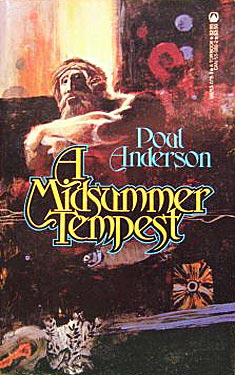Poul Anderson
Completed 11/14/2021, Reviewed 11/14/2021
2 stars
I didn’t like this book. The concept is great, an alternate Reformation era where Shakespeare was an historian and all the stories of magic and faeries are real. Unfortunately, the author not only uses 17th century words and sentence structure, but spells out the accents. It makes for extremely tedious reading. And it seems like the character with the toughest accent speaks the most. It cut my reading speed down by over a half and reduced my comprehension as well. This book won the Mythopoeic Award in 1975 and was nominated for a few others. If I wasn’t committed to reading all the Mythopoeic winners, this would have been a DNF.
The story begins with Prince Rupert. He’s been captured by Cromwell’s forces and is being held in a castle of one of the chief supporters of the revolution. There he falls in love with Jennifer, the supporter’s niece. She helps him escape with the assistance of one of Rupert’s men, William Fairweather. In the forest, they meet Oberon and Tatiana, the King and Queen of Faeries from “A Midsummer’s Night Dream”. They commission the humans to find Prospero’s books to help with the war against the Puritans. Jennifer returns home only to be beaten and tortured as a whore of Satan. Rupert and Will keep running, almost getting captured several times before they end up on a boat to Prospero’s island.
One aspect I did like in this book was that the steam engine had been invented and there were trains crisscrossing England. The anachronism is noted by alternate-universe-travelers whom Rupert and Will come across at the Phoenix Inn. The encounter is comical and thankfully fairly easy to read because the travelers speak modern English.
I didn’t find anything really special about the characters. I didn’t empathize with any of them, although I cringed during Jennifer’s torture and abuse at the hands of her uncle. She did have a sly mouth, but despite that, she was pretty much a stock female character. In fact, she one of the few female characters in the book. Rupert was not very multidimensional either. I thought his character was boring. Will, I liked. Unfortunately, he’s the character with the thickest accent. This is an example of what he says:
"Well, I too ‘ud swap theeäzam peärs an’ pomp-granites for a zingle bowl o’ hot oätmeäl topped wi’ cream an’ honey; an’ this zaber o’ miäne ‘ud liefer carve a Cheddar cheese than a traїl to glory."
Now imagine paragraphs of that. Yeah. And that’s just one of the accents. Fortunately, Rupert and Jennifer speak relatively plainly, in an Elizabethan manner.
The prose was okay. There were occasionally sentences that would make me stop to consider why Anderson would choose that word or that sentence structure, but not always in a good way. The world building is good, a direct reflection of the basic conceit.
I give the book two stars out of five for the premise and the diligence with which Anderson maintained the spelling of the accents. But it made this book tough going. I’ve only ever read a short story of his and didn’t care for it either. I think I’m going to have to find another novel by him eventually to give him one more chance. I’ll be sure to do some research before I choose because he was very prolific and I want to pick one that’s supposed to be one of his better books.

No comments:
Post a Comment